ICHB1006: Indigenous Cultures & Health Behavior Critical Reflections
VerifiedAdded on 2023/06/04
|7
|1648
|135
Report
AI Summary
This report presents critical reflections on various aspects of Indigenous cultures and their impact on health behavior. It addresses the influence of education on the health and well-being of Aboriginal and Torres Strait Islander peoples, highlighting the disparities in educational achievements and their correlation with health awareness. The report also examines the detrimental effects of racism on the mental health and social well-being of these communities, emphasizing the stress and anxiety caused by discrimination. Furthermore, it delves into the impact of culture shock on effective communication for non-Aboriginal health professionals working in remote Aboriginal communities, stressing the importance of cultural sensitivity and acceptance. The reflections underscore the need for improved education, mental health support, and cultural awareness to bridge the gap in health inequalities and promote better health outcomes for Indigenous populations in Australia. Desklib offers a range of study tools and resources for students.
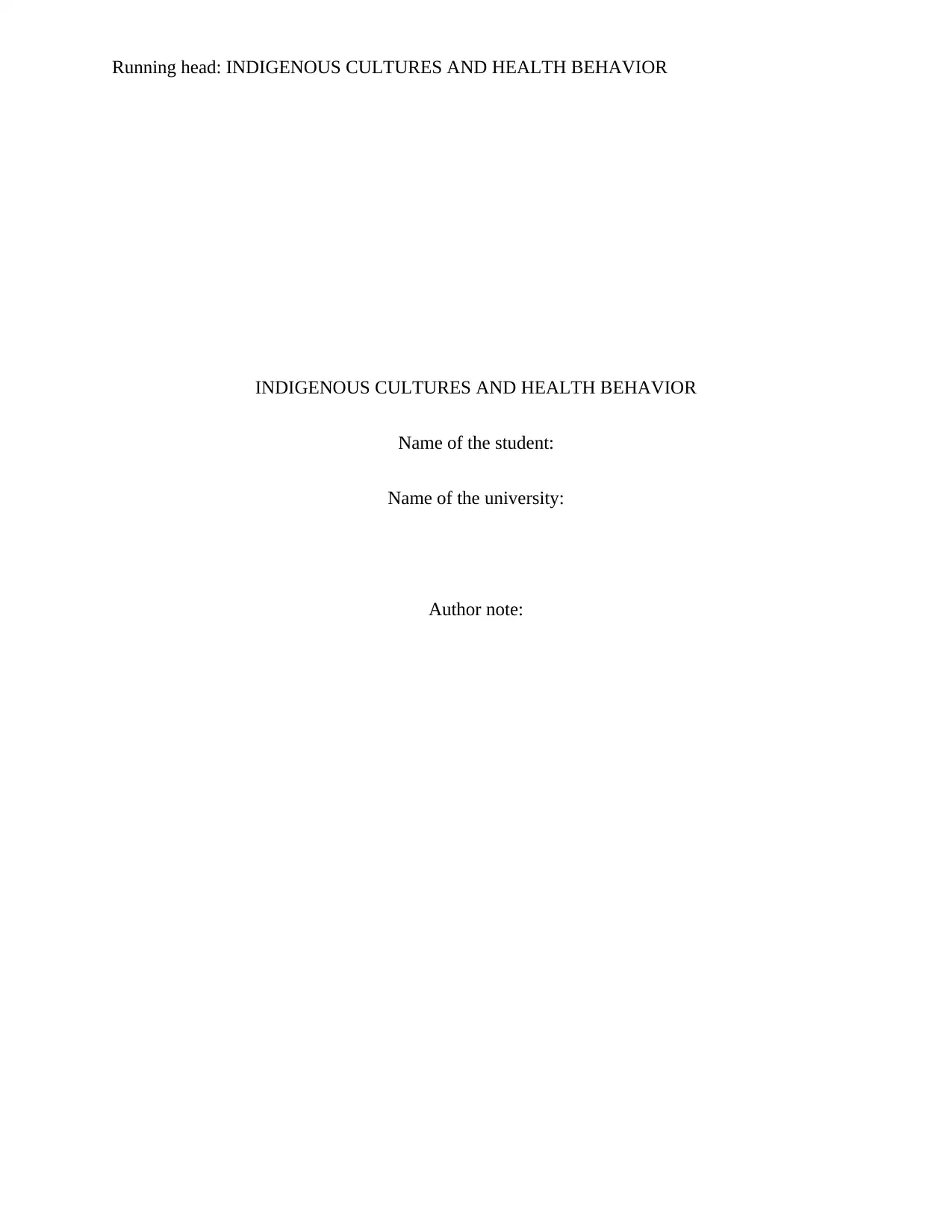
Running head: INDIGENOUS CULTURES AND HEALTH BEHAVIOR
INDIGENOUS CULTURES AND HEALTH BEHAVIOR
Name of the student:
Name of the university:
Author note:
INDIGENOUS CULTURES AND HEALTH BEHAVIOR
Name of the student:
Name of the university:
Author note:
Paraphrase This Document
Need a fresh take? Get an instant paraphrase of this document with our AI Paraphraser
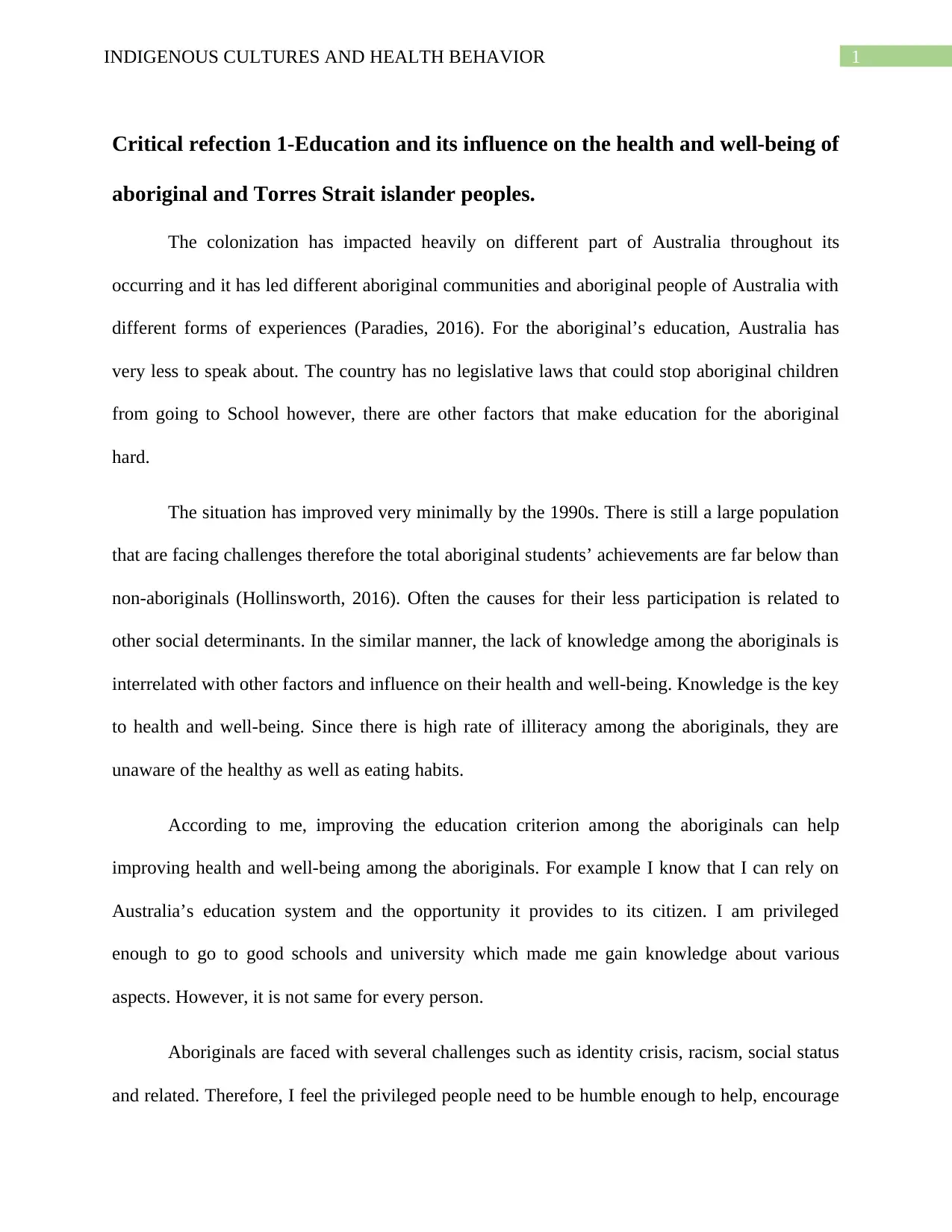
1INDIGENOUS CULTURES AND HEALTH BEHAVIOR
Critical refection 1-Education and its influence on the health and well-being of
aboriginal and Torres Strait islander peoples.
The colonization has impacted heavily on different part of Australia throughout its
occurring and it has led different aboriginal communities and aboriginal people of Australia with
different forms of experiences (Paradies, 2016). For the aboriginal’s education, Australia has
very less to speak about. The country has no legislative laws that could stop aboriginal children
from going to School however, there are other factors that make education for the aboriginal
hard.
The situation has improved very minimally by the 1990s. There is still a large population
that are facing challenges therefore the total aboriginal students’ achievements are far below than
non-aboriginals (Hollinsworth, 2016). Often the causes for their less participation is related to
other social determinants. In the similar manner, the lack of knowledge among the aboriginals is
interrelated with other factors and influence on their health and well-being. Knowledge is the key
to health and well-being. Since there is high rate of illiteracy among the aboriginals, they are
unaware of the healthy as well as eating habits.
According to me, improving the education criterion among the aboriginals can help
improving health and well-being among the aboriginals. For example I know that I can rely on
Australia’s education system and the opportunity it provides to its citizen. I am privileged
enough to go to good schools and university which made me gain knowledge about various
aspects. However, it is not same for every person.
Aboriginals are faced with several challenges such as identity crisis, racism, social status
and related. Therefore, I feel the privileged people need to be humble enough to help, encourage
Critical refection 1-Education and its influence on the health and well-being of
aboriginal and Torres Strait islander peoples.
The colonization has impacted heavily on different part of Australia throughout its
occurring and it has led different aboriginal communities and aboriginal people of Australia with
different forms of experiences (Paradies, 2016). For the aboriginal’s education, Australia has
very less to speak about. The country has no legislative laws that could stop aboriginal children
from going to School however, there are other factors that make education for the aboriginal
hard.
The situation has improved very minimally by the 1990s. There is still a large population
that are facing challenges therefore the total aboriginal students’ achievements are far below than
non-aboriginals (Hollinsworth, 2016). Often the causes for their less participation is related to
other social determinants. In the similar manner, the lack of knowledge among the aboriginals is
interrelated with other factors and influence on their health and well-being. Knowledge is the key
to health and well-being. Since there is high rate of illiteracy among the aboriginals, they are
unaware of the healthy as well as eating habits.
According to me, improving the education criterion among the aboriginals can help
improving health and well-being among the aboriginals. For example I know that I can rely on
Australia’s education system and the opportunity it provides to its citizen. I am privileged
enough to go to good schools and university which made me gain knowledge about various
aspects. However, it is not same for every person.
Aboriginals are faced with several challenges such as identity crisis, racism, social status
and related. Therefore, I feel the privileged people need to be humble enough to help, encourage
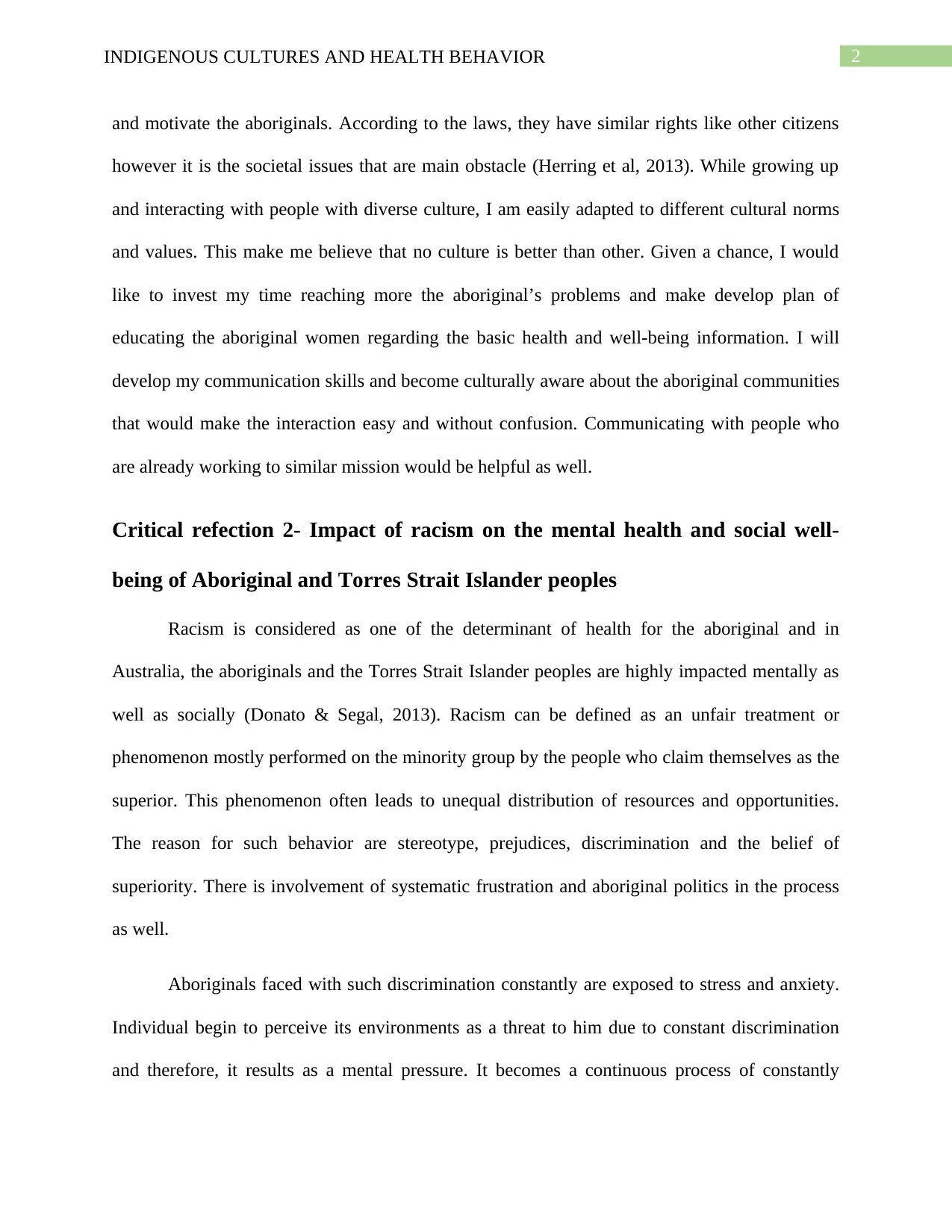
2INDIGENOUS CULTURES AND HEALTH BEHAVIOR
and motivate the aboriginals. According to the laws, they have similar rights like other citizens
however it is the societal issues that are main obstacle (Herring et al, 2013). While growing up
and interacting with people with diverse culture, I am easily adapted to different cultural norms
and values. This make me believe that no culture is better than other. Given a chance, I would
like to invest my time reaching more the aboriginal’s problems and make develop plan of
educating the aboriginal women regarding the basic health and well-being information. I will
develop my communication skills and become culturally aware about the aboriginal communities
that would make the interaction easy and without confusion. Communicating with people who
are already working to similar mission would be helpful as well.
Critical refection 2- Impact of racism on the mental health and social well-
being of Aboriginal and Torres Strait Islander peoples
Racism is considered as one of the determinant of health for the aboriginal and in
Australia, the aboriginals and the Torres Strait Islander peoples are highly impacted mentally as
well as socially (Donato & Segal, 2013). Racism can be defined as an unfair treatment or
phenomenon mostly performed on the minority group by the people who claim themselves as the
superior. This phenomenon often leads to unequal distribution of resources and opportunities.
The reason for such behavior are stereotype, prejudices, discrimination and the belief of
superiority. There is involvement of systematic frustration and aboriginal politics in the process
as well.
Aboriginals faced with such discrimination constantly are exposed to stress and anxiety.
Individual begin to perceive its environments as a threat to him due to constant discrimination
and therefore, it results as a mental pressure. It becomes a continuous process of constantly
and motivate the aboriginals. According to the laws, they have similar rights like other citizens
however it is the societal issues that are main obstacle (Herring et al, 2013). While growing up
and interacting with people with diverse culture, I am easily adapted to different cultural norms
and values. This make me believe that no culture is better than other. Given a chance, I would
like to invest my time reaching more the aboriginal’s problems and make develop plan of
educating the aboriginal women regarding the basic health and well-being information. I will
develop my communication skills and become culturally aware about the aboriginal communities
that would make the interaction easy and without confusion. Communicating with people who
are already working to similar mission would be helpful as well.
Critical refection 2- Impact of racism on the mental health and social well-
being of Aboriginal and Torres Strait Islander peoples
Racism is considered as one of the determinant of health for the aboriginal and in
Australia, the aboriginals and the Torres Strait Islander peoples are highly impacted mentally as
well as socially (Donato & Segal, 2013). Racism can be defined as an unfair treatment or
phenomenon mostly performed on the minority group by the people who claim themselves as the
superior. This phenomenon often leads to unequal distribution of resources and opportunities.
The reason for such behavior are stereotype, prejudices, discrimination and the belief of
superiority. There is involvement of systematic frustration and aboriginal politics in the process
as well.
Aboriginals faced with such discrimination constantly are exposed to stress and anxiety.
Individual begin to perceive its environments as a threat to him due to constant discrimination
and therefore, it results as a mental pressure. It becomes a continuous process of constantly
⊘ This is a preview!⊘
Do you want full access?
Subscribe today to unlock all pages.

Trusted by 1+ million students worldwide
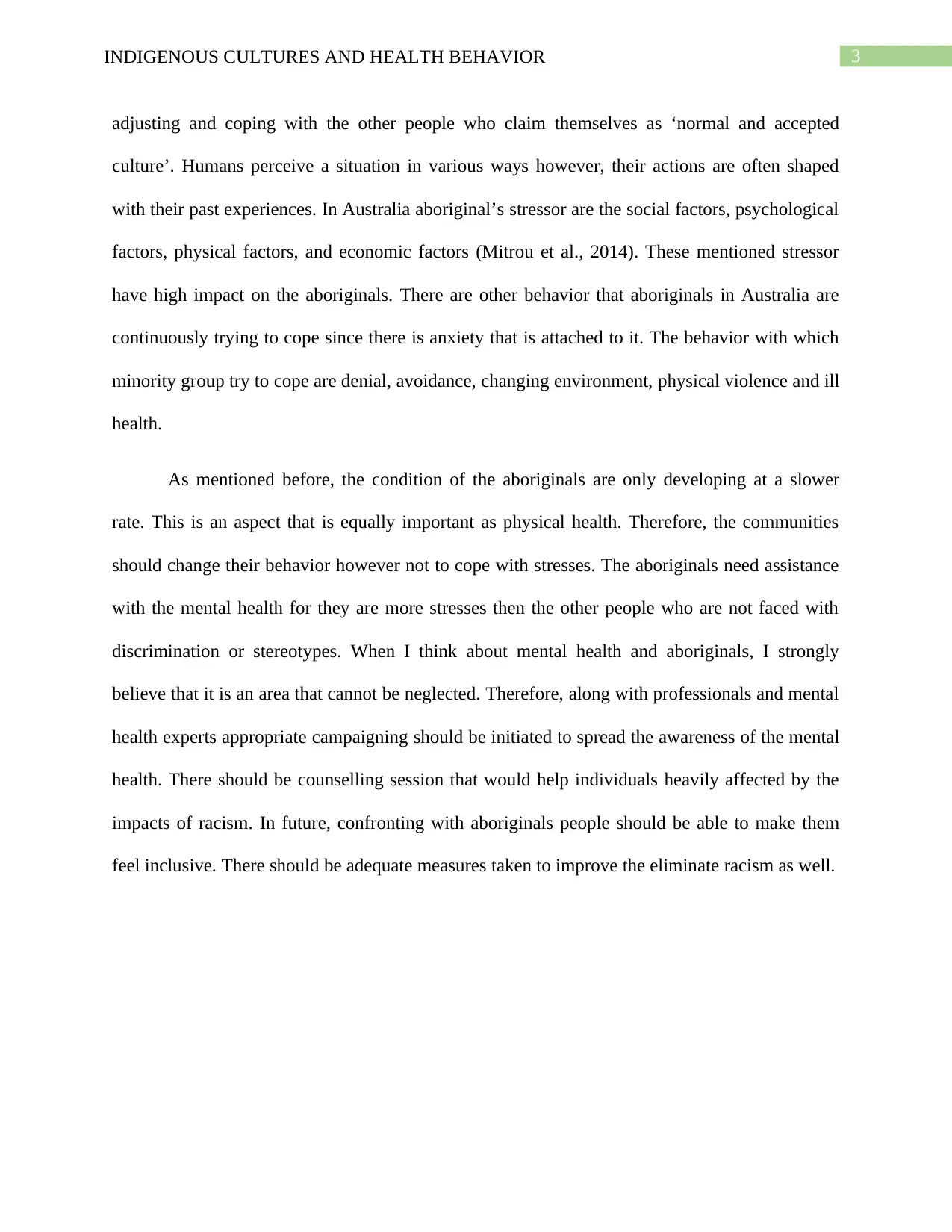
3INDIGENOUS CULTURES AND HEALTH BEHAVIOR
adjusting and coping with the other people who claim themselves as ‘normal and accepted
culture’. Humans perceive a situation in various ways however, their actions are often shaped
with their past experiences. In Australia aboriginal’s stressor are the social factors, psychological
factors, physical factors, and economic factors (Mitrou et al., 2014). These mentioned stressor
have high impact on the aboriginals. There are other behavior that aboriginals in Australia are
continuously trying to cope since there is anxiety that is attached to it. The behavior with which
minority group try to cope are denial, avoidance, changing environment, physical violence and ill
health.
As mentioned before, the condition of the aboriginals are only developing at a slower
rate. This is an aspect that is equally important as physical health. Therefore, the communities
should change their behavior however not to cope with stresses. The aboriginals need assistance
with the mental health for they are more stresses then the other people who are not faced with
discrimination or stereotypes. When I think about mental health and aboriginals, I strongly
believe that it is an area that cannot be neglected. Therefore, along with professionals and mental
health experts appropriate campaigning should be initiated to spread the awareness of the mental
health. There should be counselling session that would help individuals heavily affected by the
impacts of racism. In future, confronting with aboriginals people should be able to make them
feel inclusive. There should be adequate measures taken to improve the eliminate racism as well.
adjusting and coping with the other people who claim themselves as ‘normal and accepted
culture’. Humans perceive a situation in various ways however, their actions are often shaped
with their past experiences. In Australia aboriginal’s stressor are the social factors, psychological
factors, physical factors, and economic factors (Mitrou et al., 2014). These mentioned stressor
have high impact on the aboriginals. There are other behavior that aboriginals in Australia are
continuously trying to cope since there is anxiety that is attached to it. The behavior with which
minority group try to cope are denial, avoidance, changing environment, physical violence and ill
health.
As mentioned before, the condition of the aboriginals are only developing at a slower
rate. This is an aspect that is equally important as physical health. Therefore, the communities
should change their behavior however not to cope with stresses. The aboriginals need assistance
with the mental health for they are more stresses then the other people who are not faced with
discrimination or stereotypes. When I think about mental health and aboriginals, I strongly
believe that it is an area that cannot be neglected. Therefore, along with professionals and mental
health experts appropriate campaigning should be initiated to spread the awareness of the mental
health. There should be counselling session that would help individuals heavily affected by the
impacts of racism. In future, confronting with aboriginals people should be able to make them
feel inclusive. There should be adequate measures taken to improve the eliminate racism as well.
Paraphrase This Document
Need a fresh take? Get an instant paraphrase of this document with our AI Paraphraser
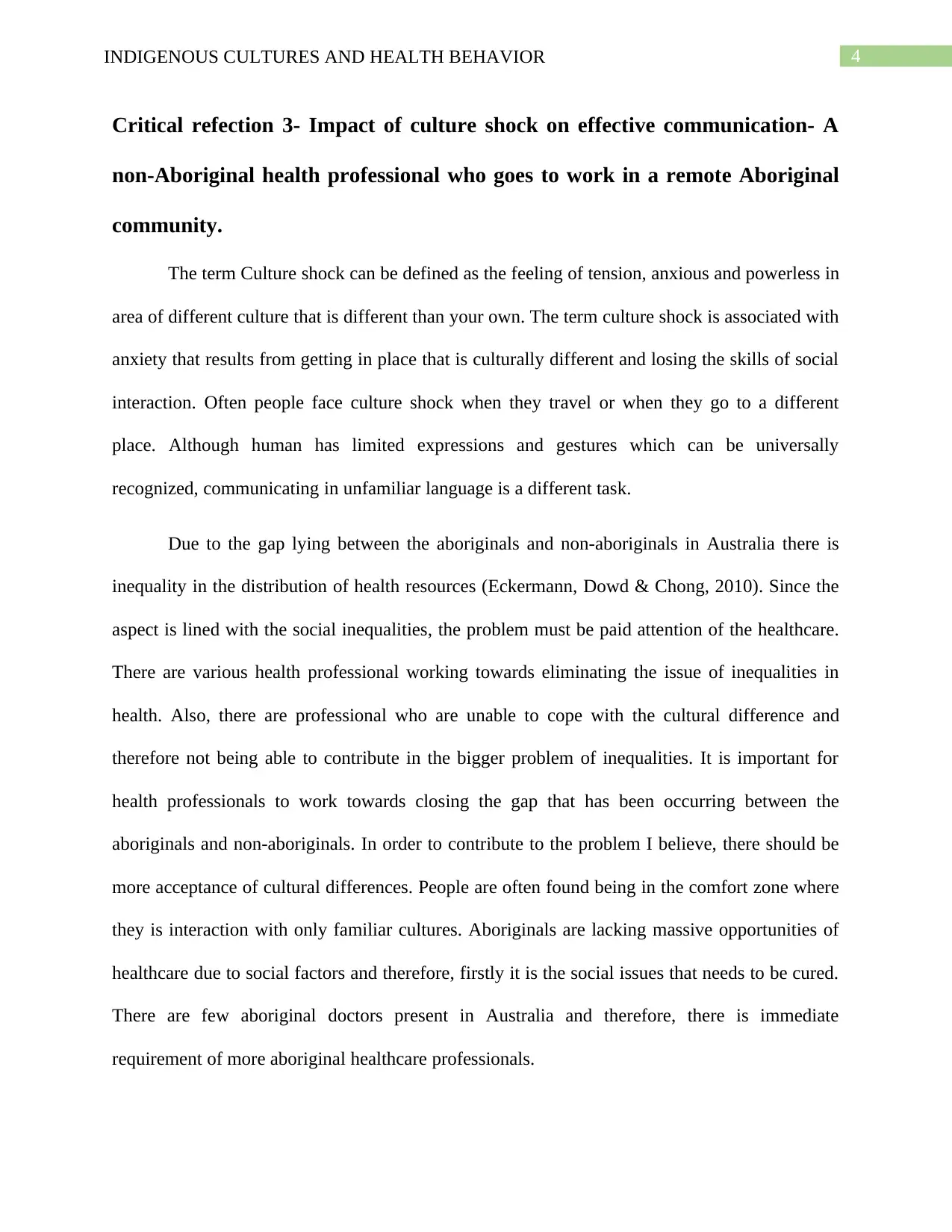
4INDIGENOUS CULTURES AND HEALTH BEHAVIOR
Critical refection 3- Impact of culture shock on effective communication- A
non-Aboriginal health professional who goes to work in a remote Aboriginal
community.
The term Culture shock can be defined as the feeling of tension, anxious and powerless in
area of different culture that is different than your own. The term culture shock is associated with
anxiety that results from getting in place that is culturally different and losing the skills of social
interaction. Often people face culture shock when they travel or when they go to a different
place. Although human has limited expressions and gestures which can be universally
recognized, communicating in unfamiliar language is a different task.
Due to the gap lying between the aboriginals and non-aboriginals in Australia there is
inequality in the distribution of health resources (Eckermann, Dowd & Chong, 2010). Since the
aspect is lined with the social inequalities, the problem must be paid attention of the healthcare.
There are various health professional working towards eliminating the issue of inequalities in
health. Also, there are professional who are unable to cope with the cultural difference and
therefore not being able to contribute in the bigger problem of inequalities. It is important for
health professionals to work towards closing the gap that has been occurring between the
aboriginals and non-aboriginals. In order to contribute to the problem I believe, there should be
more acceptance of cultural differences. People are often found being in the comfort zone where
they is interaction with only familiar cultures. Aboriginals are lacking massive opportunities of
healthcare due to social factors and therefore, firstly it is the social issues that needs to be cured.
There are few aboriginal doctors present in Australia and therefore, there is immediate
requirement of more aboriginal healthcare professionals.
Critical refection 3- Impact of culture shock on effective communication- A
non-Aboriginal health professional who goes to work in a remote Aboriginal
community.
The term Culture shock can be defined as the feeling of tension, anxious and powerless in
area of different culture that is different than your own. The term culture shock is associated with
anxiety that results from getting in place that is culturally different and losing the skills of social
interaction. Often people face culture shock when they travel or when they go to a different
place. Although human has limited expressions and gestures which can be universally
recognized, communicating in unfamiliar language is a different task.
Due to the gap lying between the aboriginals and non-aboriginals in Australia there is
inequality in the distribution of health resources (Eckermann, Dowd & Chong, 2010). Since the
aspect is lined with the social inequalities, the problem must be paid attention of the healthcare.
There are various health professional working towards eliminating the issue of inequalities in
health. Also, there are professional who are unable to cope with the cultural difference and
therefore not being able to contribute in the bigger problem of inequalities. It is important for
health professionals to work towards closing the gap that has been occurring between the
aboriginals and non-aboriginals. In order to contribute to the problem I believe, there should be
more acceptance of cultural differences. People are often found being in the comfort zone where
they is interaction with only familiar cultures. Aboriginals are lacking massive opportunities of
healthcare due to social factors and therefore, firstly it is the social issues that needs to be cured.
There are few aboriginal doctors present in Australia and therefore, there is immediate
requirement of more aboriginal healthcare professionals.
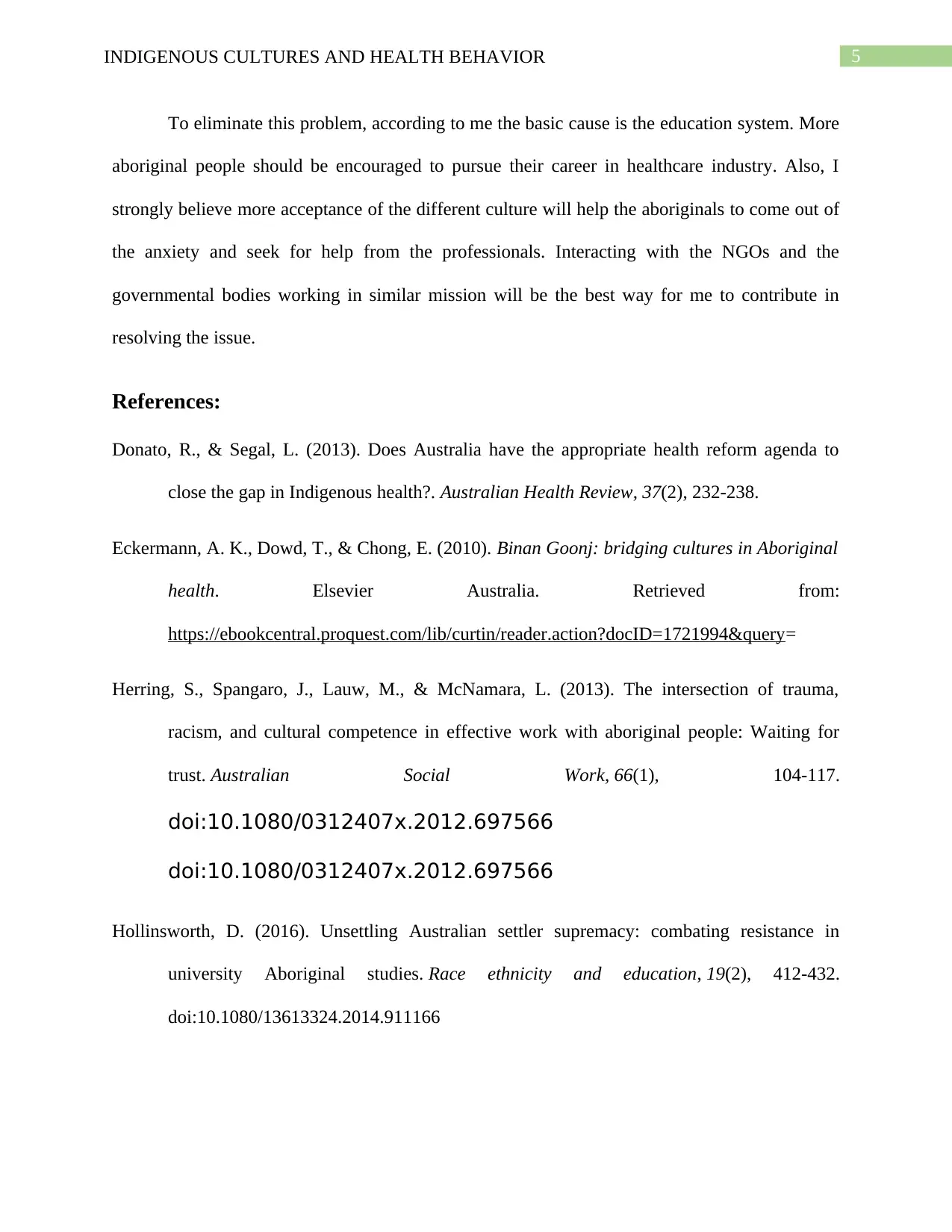
5INDIGENOUS CULTURES AND HEALTH BEHAVIOR
To eliminate this problem, according to me the basic cause is the education system. More
aboriginal people should be encouraged to pursue their career in healthcare industry. Also, I
strongly believe more acceptance of the different culture will help the aboriginals to come out of
the anxiety and seek for help from the professionals. Interacting with the NGOs and the
governmental bodies working in similar mission will be the best way for me to contribute in
resolving the issue.
References:
Donato, R., & Segal, L. (2013). Does Australia have the appropriate health reform agenda to
close the gap in Indigenous health?. Australian Health Review, 37(2), 232-238.
Eckermann, A. K., Dowd, T., & Chong, E. (2010). Binan Goonj: bridging cultures in Aboriginal
health. Elsevier Australia. Retrieved from:
https://ebookcentral.proquest.com/lib/curtin/reader.action?docID=1721994&query=
Herring, S., Spangaro, J., Lauw, M., & McNamara, L. (2013). The intersection of trauma,
racism, and cultural competence in effective work with aboriginal people: Waiting for
trust. Australian Social Work, 66(1), 104-117.
doi:10.1080/0312407x.2012.697566
doi:10.1080/0312407x.2012.697566
Hollinsworth, D. (2016). Unsettling Australian settler supremacy: combating resistance in
university Aboriginal studies. Race ethnicity and education, 19(2), 412-432.
doi:10.1080/13613324.2014.911166
To eliminate this problem, according to me the basic cause is the education system. More
aboriginal people should be encouraged to pursue their career in healthcare industry. Also, I
strongly believe more acceptance of the different culture will help the aboriginals to come out of
the anxiety and seek for help from the professionals. Interacting with the NGOs and the
governmental bodies working in similar mission will be the best way for me to contribute in
resolving the issue.
References:
Donato, R., & Segal, L. (2013). Does Australia have the appropriate health reform agenda to
close the gap in Indigenous health?. Australian Health Review, 37(2), 232-238.
Eckermann, A. K., Dowd, T., & Chong, E. (2010). Binan Goonj: bridging cultures in Aboriginal
health. Elsevier Australia. Retrieved from:
https://ebookcentral.proquest.com/lib/curtin/reader.action?docID=1721994&query=
Herring, S., Spangaro, J., Lauw, M., & McNamara, L. (2013). The intersection of trauma,
racism, and cultural competence in effective work with aboriginal people: Waiting for
trust. Australian Social Work, 66(1), 104-117.
doi:10.1080/0312407x.2012.697566
doi:10.1080/0312407x.2012.697566
Hollinsworth, D. (2016). Unsettling Australian settler supremacy: combating resistance in
university Aboriginal studies. Race ethnicity and education, 19(2), 412-432.
doi:10.1080/13613324.2014.911166
⊘ This is a preview!⊘
Do you want full access?
Subscribe today to unlock all pages.

Trusted by 1+ million students worldwide
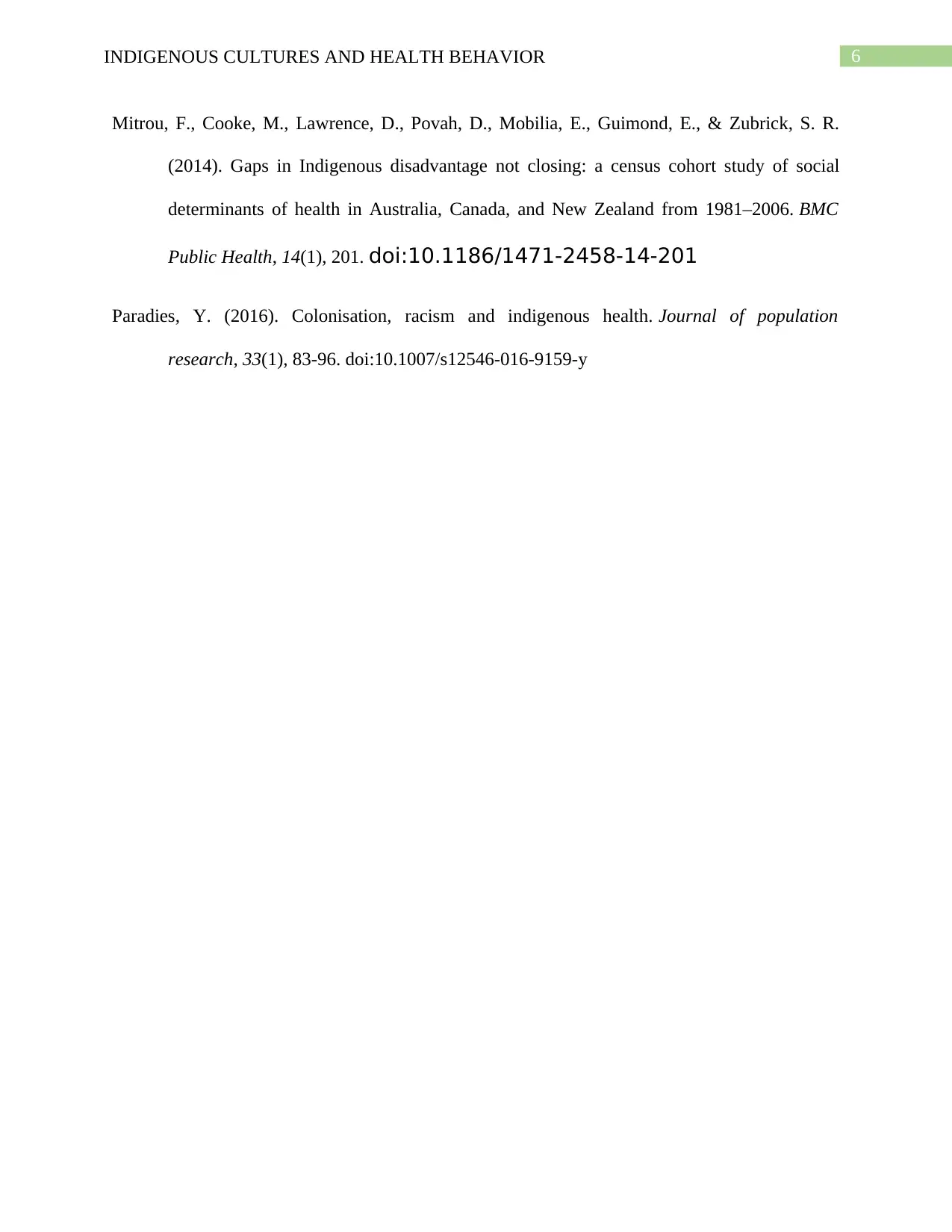
6INDIGENOUS CULTURES AND HEALTH BEHAVIOR
Mitrou, F., Cooke, M., Lawrence, D., Povah, D., Mobilia, E., Guimond, E., & Zubrick, S. R.
(2014). Gaps in Indigenous disadvantage not closing: a census cohort study of social
determinants of health in Australia, Canada, and New Zealand from 1981–2006. BMC
Public Health, 14(1), 201. doi:10.1186/1471-2458-14-201
Paradies, Y. (2016). Colonisation, racism and indigenous health. Journal of population
research, 33(1), 83-96. doi:10.1007/s12546-016-9159-y
Mitrou, F., Cooke, M., Lawrence, D., Povah, D., Mobilia, E., Guimond, E., & Zubrick, S. R.
(2014). Gaps in Indigenous disadvantage not closing: a census cohort study of social
determinants of health in Australia, Canada, and New Zealand from 1981–2006. BMC
Public Health, 14(1), 201. doi:10.1186/1471-2458-14-201
Paradies, Y. (2016). Colonisation, racism and indigenous health. Journal of population
research, 33(1), 83-96. doi:10.1007/s12546-016-9159-y
1 out of 7
Related Documents
Your All-in-One AI-Powered Toolkit for Academic Success.
+13062052269
info@desklib.com
Available 24*7 on WhatsApp / Email
![[object Object]](/_next/static/media/star-bottom.7253800d.svg)
Unlock your academic potential
Copyright © 2020–2026 A2Z Services. All Rights Reserved. Developed and managed by ZUCOL.





